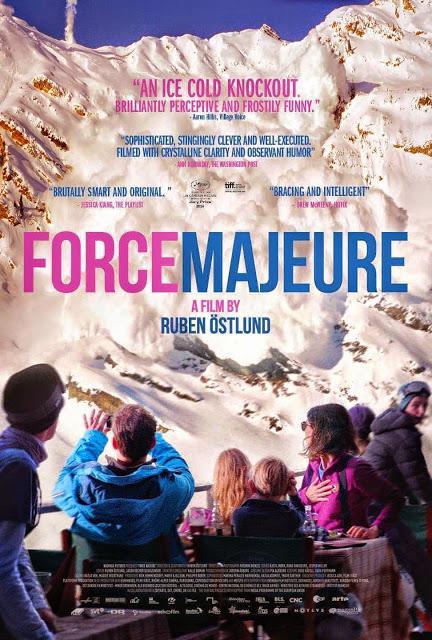
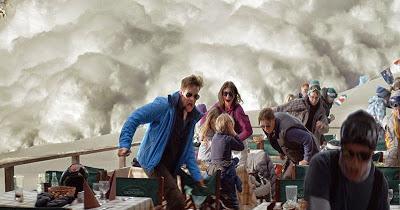
Tomas with his cellphone--an item that matters in the "Lord Jim" moment
Why then is Force Majeure, the film, worthy of being termed as a remarkable one?
First, director Östlund conceived and scripted the film all by himself. Few directors are able to do this. Ingmar Bergman and Naomi Kawase, are prominent among the select band of directors who often did/do this. American director Damien Chazelle accomplished a similar feat with the Oscar-winning Whiplash in 2014. Most viewers do not differentiate a film adapting another work from another medium from a film that is the director’s own original conceptualization. Most viewers do not differentiate directors standing on the shoulders of very competent and gifted co-scriptwriters from those directors who sculpt original films based on their own imagination and acumen. Östlund is one of the latter breed. He is able to conceive and develop a tale of a small, young Swedish family enjoying a brief costly vacation in the Alps into a complex, compressed tale of 5 days of conflict, self realization, and ultimate reconciliation, of not one but two sets of families that could have taken years, if not decades, in real time for other families.

Developing the script from the ideal tourist family on holiday
to present a complex tale of 5 days of conflict and resolution
Second, Östlund in Force Majeure deals with cowardice of principled “heroes” of society. The famous novelist Polish novelist Joseph Conrad dealt with the precise subject in his novel Lord Jim, made into a lovely film in 1965 by Richard Brooks with Peter O’Toole in the leading role. O’Toole played a ship’s captain, who in a rare moment of cowardice jumps off his sinking ship into a lifeboat, not caring for the fate of his devout Muslim passengers for whom there were no lifeboats, when by tradition the captain ought to have been the last person to leave his sinking ship. In Force Majeure, Östlund is not discussing seafarers (though the script does include mention of a recent Estonian tragedy with similar trappings) but instead focuses on the bulwark of a good Swedish family—a hardworking, successful 30-something male called Tomas (Johannes Bah Kuehnke), with a devoted wife Ebba (Lisa Loven Kongsli), and their daughter Vera and son Harry. Director/scriptwriter Östlund creates a convincing ‘Lord Jim’ situation for his devoted family as they enjoy their second day of a 5-day holiday in a plush hotel cum ski resort in the French segment of the Alps mountain range. The US director Brooks adapting Conrad’s tale had a beautiful line in his film: “It only takes a split second to make a coward a hero or to turn a hero into a coward.” There is a huge difference between an American director and a Scandinavian one—the latter is less obsessed with words and more with visuals, sound and silence. The cowardice (and heroism) is more to be perceived than heard in the Swedish film.
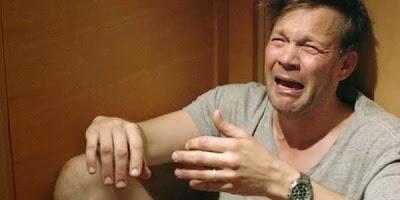
Tomas (Johannes Bah Kuehnke) accepting his cowardice
Third, Östlund uses the scenario to make an indirect commentary on male heads of families and their ability to care for the members of the family, in contrast to women like Ebba whose maternal instinct to care for the family at a moment of insecurity comes to the fore. In Force Majeure, the interesting script deals with two male heads of families Tomas and Mats, and a contrasting mother (Charlotte) they meet at the hotel , who like Ebba, is a mother of two but unlike Ebba wants her free time, in which she is not distracted by her responsibilities to her husband or children. (Interestingly the script, as in Kieselowski’s masterpiece Dekalog, where a strange silent individual transects most tales, in Force Majeure too, a silent hotel cleaning staff watches the various developments between the couples with interest). All three, Tomas, Mats, and Charlotte admit their lapses, big or small, directly and indirectly, at various stages of the film in being a responsible part of their respective family units. Charlotte indirectly admits her guilt by deferring to converse further on the observations of Ebba on the subject.
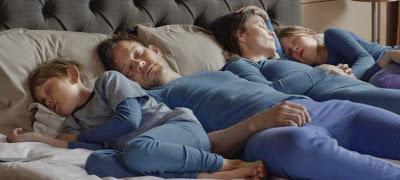
Even half asleep, the ringing phone is more important for Tomas
(the male bread winner) than all else
Fourth, Östlund uses unusual methods of filmmaking that will upset the purist. Sometimes, in Force Majeure, the speaker’s head is out of the frame; the camera is more interested in the listeners rather than the speaker. In a particular scene, the speaker, Ebba, walks around and sits with her back to the camera, and the viewer gets to see only the listeners. The Swedish director is breaking the cinematic conventions deliberately. Then there are static exterior shots that end each day, or punctuate “acts” in the film as in a play.
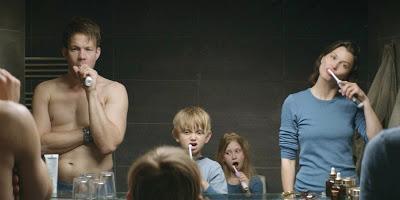
Static camera captures a mirror shot of all four members of the family
brushing their teeth
Fifth, Östlund uses the ‘Summer’ segment of Vivaldi’s Four Seasons in a manner reminiscent of the curtain falling on a proscenium stage at the end of each act. While one is befuddled by the choice of the Summer segment, the effect is indeed staggering. Most of the film does not depend on the music of Vivaldi as much as it does on the use of sound of ropeways or of creaking wooden floorboards. The sound management in the Swedish film is top notch.
Finally, Östlund uses the time-tested Edward Albee technique of the play/film Who’s Afraid of Virginia Woolf? by pitting the major husband and wife duos’ problem on another couple to extend the arguments of the film. And like Albee’s play there is certain resolution of the conflicts. Even the strong Ebba towards the end of the film shows the shades of a Don Quixote tilting at windmills, while Charlotte appears more composed and practical in comparison to her. As the film progresses, Tomas has occasion to redeem himself as a hero to his kids soon after admitting his folly to his family. The best part is arguably the final innocuous conversation between son and father (Harry and Tomas). Harry asks Tomas “Do you smoke, Papa?” on seeing his father smoke for the first time and the father replies “Yes, I do.” Tomas is finally honest and Harry appreciates it.That honest answer puts much of what has preceded in perspective and provides a final example of the director/scriptwriter’s maturity evident in Force Majeure.
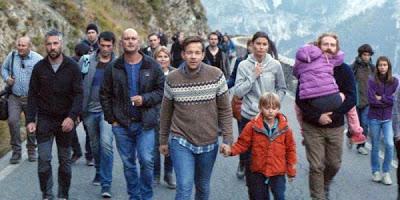
One parent who never cared about his own kids carry another's kid,
while Harry learns from his father Tomas
about his father's smoking habit for the first time
Force Majeure is not in the same league as certain important and fascinating movies of 2014 such as Leviathan, Still the Water, and Winter Sleep. Force Majeure is nevertheless a remarkable work that will make any astute viewer to sit up and admire the fresh approach to cinematography, the excellent casting, and a thought provoking original script where saving one’s cell phone (the link to your job and office) is perhaps instinctively more important than saving members of your family.
P.S. Force Majeure won the Un Certain Regard Jury Prize at the 2014 Cannes Film Festival. The films mentioned in the above review Lord Jim, Dekalog, Who’s Afraid of Virginia Woolf?, Leviathan, Still the Water, and WinterSleep have all been reviewed earlier on this blog.

